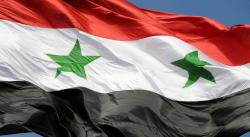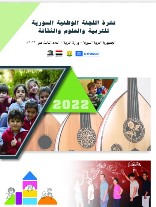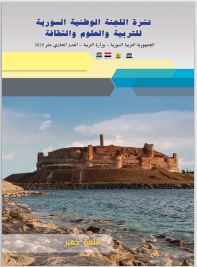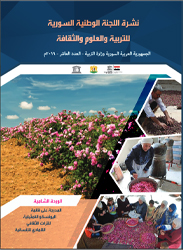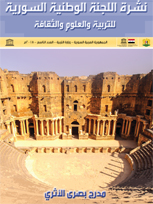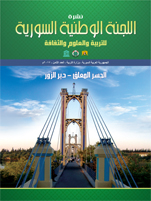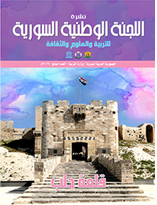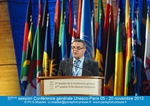The Introductory Virtual Consultation to Enhance the Awareness of the Importance of the Role of Water in Combating Corona Virus-19
|
Represented by:
- Dr. Nidal Hassan, Secretary of the National Commission for UNESCO. - Dr. Omar Abu Aoun, the Senior Supervisor of the Science Subject. - Ghaida Nozha, Science Coordinator at the National Center for Educational Curriculum Development. The Ministry of Education in the Syrian Arab republic participated in the introductory virtual consultation to enhance awareness of the importance of the role of water in combating Coronavirus-19, which was organized by the UNESCO Regional Bureau for Science in the Arab Countries - Cairo on Wednesday August 19th, 2020; within the framework of implementing the plans of the International Hydrological Program in the Arab region and supporting the development of interactive non-formal activities through a guide for teachers. It targeted two groups of school students in the Arab Region (first category: students aged 8-12 years "from the second to the sixth grade", and the second category: students aged 13-18 years "from the seventh to the twelfth grade"), so that they will be ready for implementation at the beginning of the next academic year 2020-2021 for each of these two categories, with the aim of enhancing the healthy behaviors of the students and enabling them to address the risk of the rapid spread of the corona virus (Covid-19). These activities emphasized the role of water in our life, the need to conserve it, and rationalize our consumption of it to achieve what is known as water security for us and for future generations as well as it provides students with many methods through which they can prevent infection with the corona virus, So that the student would be a partner in the process of knowledge and experiences transferring for the community outside the school. This achieves the objectives of the education process for Sustainable Development in becoming a process of transferring the practical skills that people need, and making them able to participate effectively in the development of their societies. Among the most important topics discussed in this consultation: The teachers' Guide (The Role of Water in Combating Coronavirus - Covid 19 for the ages 6-18 years), which includes: o The procedural objectives of the activities of the first, second and third stages of the education and water project, the implementation proposals of it, the steps to implement it, and the basic skills acquired during implementing it. o A presentation of the activities structure that contains 8 activities about water and its role in combating Coronavirus (Covid-19), divided into two groups: the first group for students aged from 6 to 12 years old, and the second group for students aged from 13 to 18 years old. o Two discussion sessions were presented: the first was entitled "Water and Sustainability", and the second one was entitled "New Challenges for the Current and Future Generations related to water, especially after the spread of the corona virus". o Displaying attachments (for teachers, students and parents) to be acquainted with them: Online resources of the World Health Organization. Posters containing educational instructions on how to prevent COVID-19. The Syrian participants presented interventions through which they emphasized that the education is an organized, deliberated and methodical process aims at bringing about positive changes in the behavior of the learner, and this requires the teacher to make an educational and intellectual effort that addresses the personality of the learner in order to develop and reform conscience as well as that the teacher has a major role in implementing the activities. Thus, he is a guider, facilitator and an advisor for the educational process. They noted the importance of introducing the concepts of health education in the field of epidemics, namely: the multi-disciplinary integration, which is used in the Syrian Ministry of Education, including the merging of academic units, and the independent integration. They suggested the following points: • Giving importance to the air, as air is a major transmitter of the virus, not just water. • Including concept maps in the school curriculum. • Presenting the guide to the linguists for verification. • Conducting workshops on the guide for professional supervisors and teachers, including three persons from the governorates for a period of three days. • Emphasizing the issuance of posters and pamphlets and their circulation to the schools. • Adding some concepts and information for students aged from (13-18) such as: There are some coronaviruses that spread among humans regularly, approximately every year, causing flu. The action of warm soapy water is to dissolve the fat coat of the virus, so that it cannot penetrate the human skin, and that frequent massaging of hands with soap and water disrupts the chemical bonds that allow the virus to stick to surfaces, including the hands as well as that the foam resulting from soap and water is necessary to get rid of and kill viruses. In turn, the Secretary of the National Commission, Dr. Nidal Hasan, made an intervention in which he thanked the experts at the UNESCO Regional Bureau for Science who held this consultation and their efforts to organize this qualitative meeting and the scientific methodology which was followed in presentations, and the added value of this specialized guide that could bring about positive changes in the behavior of learners and recipients. He noted that the Ministry of Education in the Syrian Arab Republic worked to include health concepts related to Covid-19 virus in the ninth and third grades of the scientific secondary school in the subject of biology. The Syrian Arab Republic applies the precautionary measures. Its citizens, in turn, adhere to the appropriate health rules and conditions, and our government is striving with all available capabilities to confront the danger of the spread of this pandemic, but it faces great difficulties related to securing food, medicine, sterilizers, basic materials, medical equipment and oil derivatives due to the unjust blockade and the sanctions imposed against Syria and the Syrians. He also referred to the practices of the Turkish occupation and its continuous attempts to cut off the waters of the Euphrates River and theft of Syrian oil in violation of the rules of the international law and the texts of the international agreements. We, the Syrians, call upon, through this platform, the UNESCO and all the member states to make possible efforts and assistance to put an end to these coercive and arbitrary measures and to lift the sanctions imposed against Syria and its people in a manner that allows its national institutions to carry out the tasks that enable them to protect their children and secure necessary health, social and educational care for them at present and in the future. This consultation was concluded by confirming its importance and the importance of its outputs asking the participants to send their comments and suggestions regarding what was discussed in it in order to develop the proposed activities to achieve the maximum possible benefit, and activate and implement these activities with the beginning of the next school year 2020-2021, so that they can be used widely in Arab countries, and the message will reach most of our Arab societies. |











